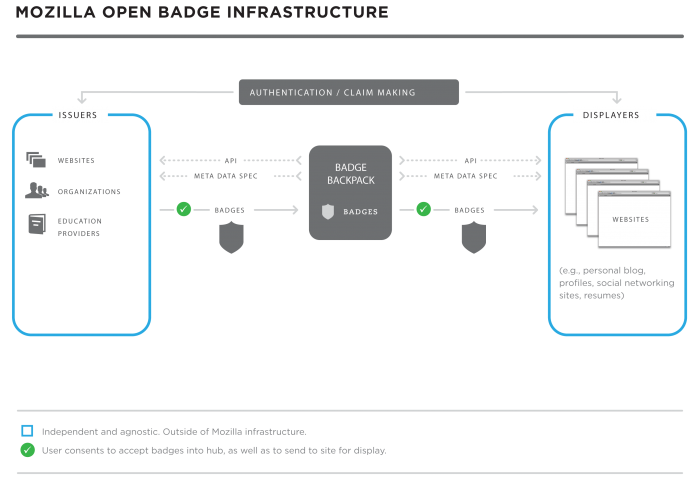What a post-Persona landscape means for Open Badges

Note: I don’t work for Mozilla any more, so (like Adele) these are my thoughts ‘from the outside’…
Introduction
Open Badges is no longer a Mozilla project. In fact, it hasn’t been for a while — the Badge Alliance was set up a couple of years ago to promote the specification on a both a technical and community basis. As I stated in a recent post, this is a good thing and means that the future is bright for Open Badges.
However, Mozilla is still involved with the Open Badges project: Mark Surman, Executive Director of the Mozilla Foundation, sits on the board of the Badge Alliance. Mozilla also pays for contractors to work on the Open Badges backpack and there were badges earned at the Mozilla Festival a few months ago.
Although it may seem strange for those used to corporates interested purely in profit, Mozilla creates what the open web needs at any given time. Like any organisation, sometimes it gets these wrong, either because the concept was flawed, or because the execution was poor. Other times, I’d argue, Mozilla doesn’t give ideas and concepts enough time to gain traction.
The end of Persona at Mozilla
Open Badges, at its very essence, is a technical specification. It allows credentials with metadata hard-coded into them to be issued, exchanged, and displayed. This is done in a secure, standardised manner.

For users to be able to access their ‘backpack’ (i.e. the place they store badges) they needed a secure login system.Back in 2011 at the start of the Open Badges project it made sense to make use of Mozilla’s nascent Persona project. This aimed to provide a way for users to easily sign into sites around the web without using their Facebook/Google logins. These ‘social’ sign-in methods mean that users are tracked around the web — something that Mozilla was obviously against.
By 2014, Persona wasn’t seen to be having the kind of ‘growth trajectory’ that Mozilla wanted. The project was transferred to community ownership and most of the team left Mozilla in 2015. It was announced that Persona would be shutting down as a Mozilla service in November 2016. While Persona will exist as an open source project, it won’t be hosted by Mozilla.
What this means for Open Badges
Although I’m not aware of an official announcement from the Badge Alliance, I think it’s worth making three points here.
1. You can still use Persona
If you’re a developer, you can still use Persona. It’s open source. It works.
2. Persona is not central to the Open Badges Infrastructure
The Open Badges backpack is one place where users can store their badges. There are others, including the Open Badge Passport and Open Badge Academy. MacArthur, who seed-funded the Open Badges ecosystem, have a new platform launching through LRNG.
It is up to the organisations behind these various solutions as to how they allow users to authenticate. They may choose to allow social logins. They may force users to create logins based on their email address. They may decide to use an open source version of Persona. It’s entirely up to them.
3. A post-Persona badges system has its advantages
The Persona authentication system runs off email addresses. This means that transitioning from Persona to another system is relatively straightforward. It has, however, meant that for the past few years we’ve had a recurrent problem: what do you do with people being issued badges to multiple email addresses?
Tying badges to emails seemed like the easiest and fastest way to get to a critical mass in terms of Open Badge adoption. Now that’s worked, we need to think in a more nuanced way about allowing users to tie multiple identities to a single badge.
Conclusion
Persona was always a slightly awkward fit for Open Badges. Although, for a time, it made sense to use Persona for authentication to the Open Badges backpack, we’re now in a post-Persona landscape. This brings with it certain advantages.
As Nate Otto wrote in his post Open Badges in 2016: A Look Ahead, the project is growing up. It’s time to move beyond what was expedient at the dawn of Open Badges and look to the future. I’m sad to see the decline of Persona, but I’m excited what the future holds!
Header image CC BY-NC-SA Barbara

Thanks for writing this up Doug. Didn’t realise that you had left Mozilla.
At present I can only log in to Backpack through Persona, and there are no options to add any other identity providers so it’s still not too clear how this is going to migrate. I’ll be watching how this develops.
Hi Andy, it’s my understanding that Mozilla is bringing on board a contractor to work on the backpack specifically. I’m sure there’ll be other approaches as it’s a reasonably simple authentication problem to solve!
Question: the “problem” seems to be the poor adoption of this technology by third parties
How much Mozilla developers contributed to implement it across the world? There are lot of open source platforms out there (WordPress and other CMS, phpBB, etc) that move a big part of the whole web… if Persona had been implemented in them probably its adoption shall be a lot more important
just thinking about…
Hi Emanuele,
I agree. For example, if Persona hadn’t been:
a) a name inherited from another product (it previously referred to themes in Firefox)
b) integrated more with Firefox
…then I think it would have gained more traction. But, hey-ho. I’m more interested in Open Badges than Persona.
Hi Doug. Good post. Spot on. I think badge “systems” should be the authority for defining identity and provide standardized APIs for validate against identity tokens. The platform (ie, BadgeKit) should manage auth strategies and provide blockchain-based “notarization” / validation processes.
Perhaps this could be added to the BadgeKit framework in 2016. In fact, this is an area that I’ve been actively working on. I’ve added single sign on / identity management and badge awarding + signing workflows for a professional training platform. Rather than email, we are using a token/GUID identity that supports multiple context and using the blockchain for signing.
Hopefully this can be a case that opens more discussion and collaboration.
Ok, back to code.
If Mozilla destroys all the login data doesn’t that mean my school loses access to all our backpacks and badges??? How would we transfer badges over to new login accounts??
I’m fed up of Mozilla now. They are getting as bad as Google for quickly dropping projects.
Hi Lisa, perhaps I haven’t explained it correctly. The data inside the backpack isn’t going anywhere. It’s just the means by which you access that data.
So, to use a more homely metaphor, instead of using keys to get into a building, you might use a smartcard instead.
What did you use for the mockup in this post?
This was taken from the Badge Alliance website, so not sure!